|
TRANSLATE THIS ARTICLE
Integral World: Exploring Theories of Everything
An independent forum for a critical discussion of the integral philosophy of Ken Wilber
 Ray Harris is a frequent contributor to this website. He has written articles on 9/11, boomeritis, the Iraq war and Third Way politics. Since 2007 he took to writing his novels Navaratri, Wild Child and Eden. Harris lives in Ballarat, Victoria, Australia. Ray Harris is a frequent contributor to this website. He has written articles on 9/11, boomeritis, the Iraq war and Third Way politics. Since 2007 he took to writing his novels Navaratri, Wild Child and Eden. Harris lives in Ballarat, Victoria, Australia.
Integral GeopoliticsPart 3: Complex PluralismRay HarrisINTRODUCTION
The higher ethical principle at play here is that every individual has the right to realise their full potential.
Integral theory has to juggle multiple hierarchies. In my previous essay I made reference to Kohlberg's stages of moral reasoning. In this essay I will make reference to Commons's model of hierarchical complexity (MHC) (1). But before that, by way of orientation, a reminder of the terms egocentric, ethnocentric and worldcentric, which are used to describe the locus of concern of groups or individuals. As we will see these are linked to cognitive capacity. In 2002 I was invited to address the Society for Research into Adult Development conference held at Pace University in New York. The subject of the talk was my essay 'The Blood Brotherhoods' (2). At the time I was involved in Wilber's Integral Institute politics sub-group and through the connections I had made, I used the trip to meet with a number of people involved in what might be called integral politics. I met with Wilber to discuss what role I might play in the I-I. I talked with Don Beck over the phone. But more importantly, in terms of this essay, I visited Sara Ross at her home in Cincinnati and we both travelled to the SRAD conference where we met Michael Commons. Michael generously encouraged me to turn my Temenos (3) system into a doctorate and then go and work with him. For various reasons I was unable to do so, but Sara Ross was able to take up his offer and she has since collaborated with Michael on several occasions. One of those collaborations forms the basis of this article, their paper: Applying Hierarchical Complexity to Political Development (4). HIERARCHICAL COMPLEXITYBut first a reminder of the MHC, which extends Piaget's system of cognitive development to adult stages. Starting at Piaget's concrete stage. Concrete Stage (ages 7-11)Can do long division, follow complex social rules, takes on roles and coordinates self with others. Can create meaningful, concrete stories and keep the same story intact and consequential over time. Puts together groups of paragraphs into a story. Can thus keep track of interrelations (which is the best tool, and how would you test it, etc.), social events, what happened among others, reasonable deals, history, geography.
Abstract Stage (ages 11-14)Can form abstract ideas and thoughts: single, generalised variables that fall beyond the concrete sequences of events in a story, can make and quantify abstract propositions. Relates to categories and uses 'cases of events' to incrementally improve the understanding of these categories.
Formal Stage (ages 14-18, if at all)Can identify relations between abstract variables and reflect upon these relations, devise ways to test them, etc. Solves problems using algebra with one unknown, uses logic and empiricism. Can speak a full, rich language with self-reflection, uses logical sequences of connectives: if this, then that, in all cases.
Systematic Stage (ages 18+, if at all)Can identify patterns among linear relationships, thus forming systems of relations among abstract variables and how these interact. Can thereby also solve equations with several unknowns. The first 'post-formal' stage, i.e. it was not described by Piaget, but implicated in Kohlberg's work. Begins to discuss legal systems, social structures, ecosystems, economic systems and the like.
Metasystematic Stage (early 20's +, if at all)Can compare and synthesise several systems with differing logics, put together metasystems or conclusions that hold true across different system, reflect upon and name general properties of systems. Understands that things can be homomorphic, isomorphic, etc. This means that you can see how one system can be changed in corresponding or differing ways to another system.
Paradigmatic Stage (mid-20's +, if at all)Can deal with several very abstract metasystems to create new ways of thinking about the world, new paradigms, new sciences or branches within sciences. Has a fractal way of thinking, so that the universal principles found are applicable to many different levels of analysis and phenomena.
Cross-paradigmatic Stage (late 20's +, if at all)
Can deal with several paradigms to create new fields. Examples are: Newton's reformulation of physics, Darwin's theory of evolution, Einstein's theory of relativity, the invention of quantum physics, the invention of chaos mathematics and complexity, the invention of computing, the invention of postmodern philosophy, the invention of the holistic “integral theory” of Ken Wilber, the invention of string theory, the invention of the MHC theory. An Important CaveatUnlike Wilber's system, Commons MHC is linked to inherited IQ. Piaget considered the highest level to be formal reasoning found in most adults of average IQ, that is 100. Any higher stage requires approximately one standard deviation - 15 points This means systematic appears at 115-130, meta systematic at 130-145, paradigmatic at 145-160 and cross-paradigmatic at 160+ . This becomes an issue when attempting to apply Graves's values levels or its Spiral Dynamics variation. According to the MHC it is impossible for someone of average IQ to fully integrate the higher values stages. Here it is necessary to introduce the concept of mimicry. It is certainly possible for someone with an average IQ to understand the SD model, but they will inevitably interpret each level according to their cognitive capacity. The average IQ sits at Orange/Green. It will therefore interpret the second tier stages from that perspective. A great deal depends on cultural, peer group and familial circumstances. For example, the USA is predominantly Orange and so many in the Integral movement in the US interpret the second tier stages from an Orange perspective. This is evident in attempts to monetise Integral theory or to modify the general theory to create a proprietary brand (as Beck did with Graves original work). This will be a difficult thing for many to hear. But unless you have the fortune to be born with an above average IQ you are unlikely to operate at the higher stages. A factor that has important political ramifications as we will discuss later. THE POLITICAL STAGES OF HIERARCHICAL COMPLEXITYConcreteDyadic relationships are prevalent (e.g., to plan deals, trade favours, and barter) and coexist with forming factions. Others' perspectives are considered only if those others affect oneself or one's close group or enable deals that both parties regard as fair. Thus, hostage takers and human slave and sex-slave traders consider hostages' or slaves' perspectives and feelings only to the extent that the person who is taken can offer some reward or help them avoid some punishment. Centralised governments are personally feudal or dictatorial, populated by lesser lords and aristocracy, advisers, retainers, friends, family, servants, and sycophants. Bureaucracies as civil services do not exist in societies at a (hypothetically) pure concrete stage. At this stage, specific officials (e.g., a king, leader, warlord, president, or minister) essentially “are” the government from the concrete stage perspective. This is because roles are not separated from the ones who fill the roles. They do not have to be, because leaders are personally known or known of, and followership is based on personal and economic ties, not roles. Without concepts of contracts or title to goods, government is not needed to regulate transactions; physical possession constitutes ownership and power.
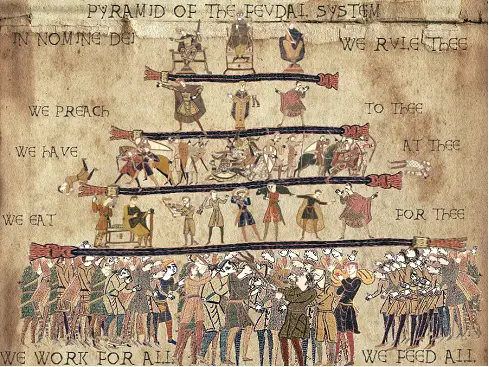
Pyramid of the Feudal System
AbstractIn abstract stage societies, group associations begin as memberships in political parties, trade associations and unions, and religious organisations. In contrast to the concrete stage, one can feel that one is in a social relationship with others and be loyal to it, even without proximity to other members. Loyalties to groups, leaders, and belief systems are strong. These loyalties are sometimes unquestioned, because group memberships help people form their identity at this stage. Strong, paternal-type leaders, often charismatic, tend to be preferred, on the assumption they will take care of their children/followers and keep the group or society harmonious and fair. A so-called ideology often espoused by leaders in abstract stage society is actually comprised of characteristically dualistic assertions about prejudices, stereotypes, and definitions of the “in-group” and the “out-group.” People performing at the abstract stage value social norms, thus can negotiate by trading normative values (unlike concrete stage's dealing in tangible currencies from money to animals to people). When real differences cannot be solved any other way, abstract stage negotiations can agree to live with them to preserve harmony.
FormalFormal stage societies develop empirical interests in increasing productivity, training, and wealth distribution, which in turn lead to formal economics and laws. People functioning at this stage participate in the formal economy. Truly bureaucratic governments form, with extensive written laws and regulations that are implemented in “letter of the law” fashion. Law is effective in moderating crime, including terrorism. Societies discover that the existence and enforcement of criminal and civil law promotes trade and investment. This connection is made easily at this stage because each is a simple empirical relationship between two variables. Competition is largely civil and regulated. The contingencies of the marketplace control social relations and status. This societal stage is the objective of many efforts to introduce democracy.
SystematicIn systematic stage societies, systems of relations are coordinated among the legal, societal, corporate, economic, and national spheres. At this stage, government systems are complex enough to address and achieve multiple goals simultaneously, society is predominately lawful, and advanced accounting practices make business relatively transparent. Markets, stock exchanges, and the like produce complex impersonal relationships among people, and more intricate laws and regulations stabilise markets and prevent monopolies. These laws deal with multidimensional aspects, requiring advanced systematic stage actions. Applications of laws are more “in the spirit of” than “the letter of” the law. Democracy can function as such and governmental processes are orderly and mostly fair. At this stage, more highly abstract concepts appear, such as transparency, accountability, social justice, and sustainability.
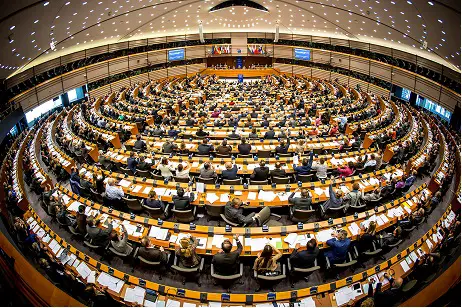
European Parliament, Brussel
Metasystematic.At this stage, our analysis suggests that governments must do a more complex job of, for example, conceptualising the legal system and international development. They would use context aware environmental, behavioural, and psychological analyses in conjunction with scientifically informed bases. One source of incompleteness of such political metasystems is that they still fail to incorporate the much higher amount of complexity involved to adequately qualify any system of duties, for example, beyond 'one size fits all'. Such systems are limited by assumptions that do not stand up to the order of complexity that actually must be addressed.
Paradigmatic.The Paradigmatic stage does not yet exist at a societal level, thus, this section is speculative. In general, this stage is defined by fitting metasystems together to form new paradigms. Tasks at this order are more difficult than governments' stage of performance can yet recognise or even address the need to do so. Because the tasks are extremely complex and therefore difficult, processes to enable at least partial syntheses tend to be developed instead. These may take the form of weak political structures, accommodating the impossibility of developing a complete and consistent set of governing principles, as did Madison, in drafting the U.S. Constitution: he recognised the incommensurate and potentially conflictual systems of administration, legislation, and justice. Future paradigmatic societies, we expect, will resolve such institutionalised conflicting claims. In doing so, they will employ choice between many possible axioms underlying abstract conceptions of society that is not tethered to and thereby limited by the abstraction of the individuals that limits earlier stages. They will attempt to coordinate the complex array of metasystems that constitute the complex causation of societal ills. Paradigmatic approaches to governmental and societal issues will use co-construction of an acceptable shared set of precepts and co-constructed solutions by all stakeholders, including real or perceived enemies. People performing at the metasystematic stage and above do not project enemy status on others because they successfully coordinate multiple actors' perspectives. The Politics of Multiple Levels.Human groups have always contained individuals at different developmental levels. Even palaeolithic and neolithic hunter-gatherer groups have had their idiots and geniuses. The individuals who conceived of weaving and knitting exhibited at least formal, if not early systematic thinking. Advanced techniques such as crochet involves complex geometric understanding. Knowledge is cumulative. A neolithic individual with an IQ of 160 may not have understood Newtonian physics, but they may have been fascinated by geology and had some of the first insights into metallurgy. 
Designs by Grace Fearon
At the same time, individuals at systematic and above are correspondingly likely to exhibit postconventional moral reasoning, which can put them at odds with their preconventional and conventional compatriots. Whilst history is full of examples of individual geniuses who have made a significant impact on their culture and time, such as Buddha, Confucius or Charlemagne, there have been perhaps many more who have been suppressed and even killed, such as Socrates, or put on trial like Galileo or Da Vinci. Change is not always welcome. The key factor here is the degree of political influence of each of the levels. The standard distribution curve indicates that in any given society 13% will be at concrete, 34% at abstract, 34% at formal, 13% at systematic and 2% at metasystematic. If politics is about numbers, then metasystematic thinkers are clearly in the minority. This means that any influence they might exert will be through leadership in influential institutions. In feudal societies this has typically been as a member of the educated elites, either the aristocracy (as ruler or advisor) or the clerisy. As education became more widely available, they gravitated towards universities and thence into the wider society as public servants or leaders in private organisations. The archetype of the good king suggests a ruler who promotes learning and seeks advice from wise council. In contrast the tyrant acts impulsively and feels threatened by court or clerical advisors and so surrounds themselves with sycophants. But this dynamic also plays out in societies manifesting more complex political systems. In modern liberal democracies the levels are revealed in electoral demographics, with political parties expressing the values of certain sections of the population. Although it must be promptly added that this is not the only factor. Conflict can arise between horizontal political values. A good example of this is religious, ethnic or ideological conflict - concrete level Muslims fighting concrete level Jews over holy sites. 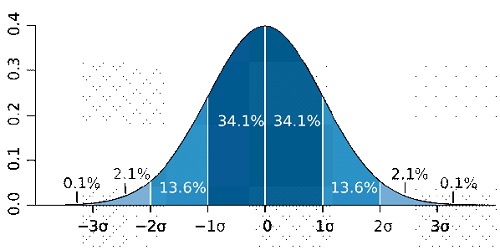
A plot of normal distribution where each band has a width of 1 standard deviation
Vertical conflict can be found in every society, even advanced democracies. The United States is currently experiencing an intense vertical conflict that many Americans on both sides argue has split the nation. The causes are strongly contested, but the demographics tell the story. The leadership of the Republican Party (especially Trump) have decided to appeal to the section of the population centred at concrete and abstract, leaving the Democrats to seek votes from the formal and systematic population - a conflict between so-called 'conservative' and 'liberal' values. Of course, it is never that simple. Individuals at any stage might choose either party for sound reasons. The harsh polarity of the US system is due in large part to their first past the post voting system, which prevents the rise of third and fourth parties. I'm Australian and the demographic differences have created a four-way contest between the Nationals, Liberals, Labor and Greens, with the Liberal party currently being torn between the centre-right and far-right factions - or formal stage entrepreneurial middle-class and the concrete stage religious traditionalists. Mitigating Factors.I am being necessarily brief. A full explanation of the nuances would take a book. But here I would like to detail some exceptions to the general model. Human behaviour is governed by multiple factors and the above assumes something of a clean slate. It does not take account of the genetic variations that cause psychopathy or neurological-diversity, the impact of social and familial conditioning, or the impact of trauma inspired complexes, such as anxiety, depression or aversion/addiction. It cannot be guaranteed that a psychopath will develop the empathy required for postconventional moral reasoning. Similarly a person on the autistic spectrum may lack the ability to correctly assess the emotional signalling vital to navigate social situations. It is also possible for any individual to be indoctrinated by the values of the society and family they were born into. An example is the persistence of religious or nationalist beliefs. There is an an increase in scepticism of conventional religion with each increase in the standard variation of IQ, with many at the systematic and metasystematic professing atheism and/or non-ideological thinking. Yet it is clear that some very highly intelligent people are devout believers in either a religious or secular ideology. Trauma can also distort affective and cognitive processes. The impacts of child abuse are well understood and whilst individuals at higher stages might be better able to understand and regulate their traumatic response, they may still be affected COMPLEX PLURALISMIt is really only at systematic that individuals understand that each prior level is a system with specific characteristics. At metasystematic the individual begins to understand how these systems interact as an ecology; to recognise their inevitability and necessity to political health. Unfortunately the earlier stages are, to recall the terms egocentric and ethnocentric, stage-centric. That is, they each have a form of cognitive and affective myopia that prevents them from understanding how individuals at other levels think and feel. Individuals at other levels are considered as 'other', as somehow wrong or bad and subjected to the process of stereotyping and demonising. We see this in action in the contemporary culture wars. The higher, postconventional stages understand that each stage has, following Maslow, its own hierarchy of needs. Individuals at the ethnocentric stage need to feel that the group they identify with is secure from threat before they can relax enough to tolerate the existence of other groups. Demagogues succeed by appealing to the prejudices and fears of these groups. The failure to satisfy the needs of the lower stages only leads to political instability. It follows that individuals at the higher stages understand vertical instability and the imperative of satisfying the needs of each level without prejudice. A difficult task. Potential and Actualisation.There is no guarantee that an individual born with an inherent IQ (whatever it might be) will attain their full cognitive potential. Let us take the example of a girl with an inherent IQ of 145. The likelihood that she will achieve her full potential depends on many factors. If she is born in Somalia during a severe drought she may suffer from malnutrition that will affect her cognitive ability. If she is born in the middle of conflict she may be killed or suffer some physical or psychological trauma. If she is born in Afghanistan she may be denied an education. If she is born in impoverished circumstances she again may be denied an education. If she is born into an abusive family she may suffer psychological trauma that again limits her potential. If she is born in a deeply conservative religious family, they may seek to suppress her potential. If she is born into a traditionalist society she may be bullied and shamed for merely being postconventional. Even if she is born into a prosperous society with a good education system, she maybe bullied by her peers for being 'different'. The same process applies for an individual born with an intellectual or physical disability. There are multiple circumstances in which individuals with a diagnosed intellectual disability are unable to reach their full potential. Some barriers are purely ideological. It is concerning to see a rise in what Ken Wilber has called 'flatland' - the belief that all individuals are essentially the same and that the only reason they do not succeed is because of structural disadvantage. This ideology speaks of equity instead of equality of opportunity. Structural and cultural barriers are real, but equity can involve promoting an individual based on characteristics other than natural ability. Flatland can also act to suppress individuals with a greater capacity in order to maintain a false sense of equality. For example, a school system that does not allow for the identification and acceleration of gifted students out of a concern to not to appear to give special treatment. The higher ethical principle at play here is that every individual has the right to realise their full potential. Expanded to a global perspective this means that each society has the duty to realise the full potential of their citizens. Collectivism vs IndividualismA common criticism of the 'West' (which, as I have argued, is a fiction) is that it is too individualistic. This claim appears in Putin's polemical justification for his invasion of Ukraine. He says he is fighting a proxy war against European decadence and individualism. The simple fact is that the higher the cognitive capacity, the more likely the individual is to question authority. There is a reason Kohlberg called his higher stages of moral reasoning postconventional. A biographical survey of the world's geniuses shows a high degree of individualism, often to the point of eccentricity and unconventionality, even amongst those individuals who created a philosophy based on some form of collectivism. A good example is Karl Marx who shunned the conventions of the time to single-mindedly pursue his philosophical interests. During the writing of his major work, Das Kapital, he was financially supported by his friend Engels. And even though communism was later used to impose rigid conformity, the theory behind it is decidedly postconventional and metasystematic. Every society has examples of unique individuals who create entirely new ways of doing things. This is hardly confined to the 'West'. India has a long standing tradition of the avadhut - a religious devotee who lives outside the constraints of society. One that comes immediately to mind is Lalleshwari, who adopted the Naga tradition of nudity (sky-clad) in defiance of the traditional role of a woman. In China, Taoism has the trope of the lone mountain sage. Buddha is known for leaving his life as a prince to live as a hermit. Jesus was crucified and Mohammed was exiled from Mecca. Outcasts and outlaws. 
The 14th century naked, wandering, Kashmiri yogini: Lalleshwari
The process seems straightforward. A set of principles established through an act of individual creative genius is later interpreted by the vast majority at concrete, formal and abstract as a set of rules that must be rigidly adhered to. Within a few centuries the radical ethics of Jesus had been turned into doctrine, with competing factions fighting bitterly for dominance. Christianity became a tool of conformity and obedience. The complaint against individualism is really a complaint by the conventional stages of development against the postconventional; a complaint by traditionalists against cultural innovators; a complaint by authoritarians against individuals who question their authority. Conflict Causation and Resolution.Conflict is inherent to all natural systems. Species compete or cooperate to survive. In the MHC conflict is of two types: horizontal and vertical. Horizontal conflict occurs between individuals and groups at the same level of cognitive development. Vertical conflict occurs between individuals and groups at different levels of cognitive development. An example of horizontal conflict at the concrete or early feudal stage is the almost constant jostling for dominance between rival warlords. This is found across all societies, east to west, north to south; from Viking raiders establishing footholds in Anglo-Saxon lands or amongst the Slavs of modern Ukraine to Mongol warriors sweeping into Europe, or rival shoguns battling for dominance in Japan. 
A photo shows Japanese Samurai Warriors (toptenz, , n.d.)
Vertical conflict occurs when an emerging developmental level challenges the authority of pre-existing levels. This can be evolutionary (or revolutionary) as the emerging level gains ever greater influence. Or it can be devolutionary/reactionary as prior levels resist the influence of the emerging level. Furthermore, each level has a typical mode of conflict:
It follows from this that one of the key indicators of developmental level is the preferred method of conflict resolution or justice. Does the person/group seek to resolve a conflict through the use of violence or through negotiation? Does the person/group seek revenge and punishment or do they seek a mutually acceptable compensation/settlement? Does the person/group seek arbitration through a justice system or do they seek reconciliation through mutual agreement? Complexity and Chaos.It follows that the postconventional stages are disruptors. Einstein's discovery of a new paradigm of physics disrupted Newtonian certainties. In turn, other physicists articulated quantum mechanics, which disrupted Einstein's relativity. In an entirely different field artists such as Van Gogh, Gaugin, Cézanne, Picasso, amongst others, disrupted the art world, changing the rules entirely. Similar disruptions happened in literature, theatre and music. People with a short view of history may look to the post WW2 period as a disorientating period of social change, but it was never as radical as the late 19th and 20th century in terms of cultural innovation and disruption. A period that saw the rise of psychoanalytic theory, the development of social sciences, especially anthropology, Socialist and Fascist politics, a complete revolution in physics, biology (and other sciences) and a dramatic shift in the artistic expression. The sexual revolution of the 60's was inspired by early 20th century sexologists such as Wilhelm Reich.
In my essay 'The West isn't Western' (5) I explained how Western Europe was first shaped by Asian culture and then by its engagement with the larger world - the Enlightenment influenced by Native American thought. The Greek empire was in fact not 'Western' but Asian. Modernity is not specifically 'Western' either, it is in fact universal, the result of centuries of knowledge accumulation. It is a matter of geography and advances in naval technology that enabled Western European powers to expand around the globe. Yet few seem to know that at the same time that Columbus set sail to discover a western sea route to the Indies, the Ming dynasty sent five 'treasure' expeditions that reached as far as East Africa on ships allegedly several times larger than any Spanish or Portuguese ship of the time. 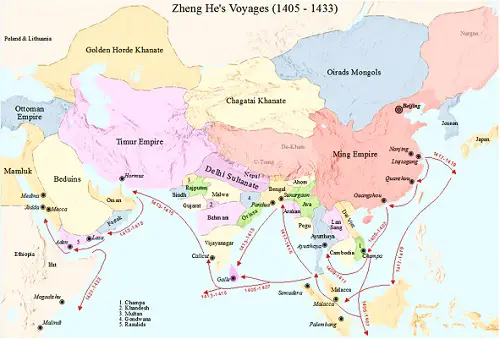
Chinese exploration (1405-1433) Voyages of Zheng He
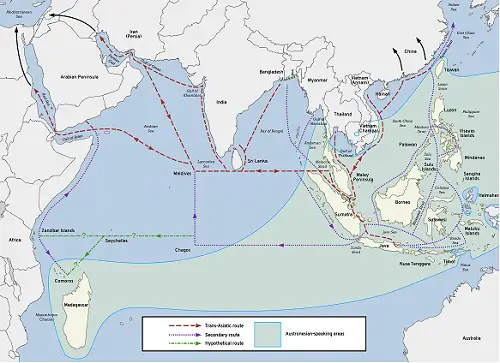
SE Asian trade routes
Long before Europe established its own colonies, SE Asia had been subject to several waves of colonial expansion: Hindu, Chinese and Muslim. This placed enormous pressure on the indigenous people of the region, with some groups shifting allegiance several times, thus leaving the region an intriguing mix of indigenous tribal cultures, Hinduism (Bali), Buddhism, Islam and Christianity. Muslim colonisation has caused several unresolved conflicts: with tribal groups in West Papua, Hindus in Bali, Buddhists in Myanmar and Thailand, and Christians in the Philippines. In a strange twist of history, the Australian aborigines were left relatively untouched. Although it is now known that Indonesian fishermen visited the north of Australia and sometimes returned with Aboriginal wives, no permanent settlements were ever established. The rest of the continent was left untouched until the 18th century with the arrival of the French and British (the Dutch had arrived earlier but did not establish any colonies). For this reason Aboriginal culture remained relatively static for close to fifty thousand years or so. My point here is that humanity is restless and expansionary. I have not mentioned the expansion of humans throughout the Pacific, with New Zealand settled by Tahitians around 1300 AD, the last continent to be inhabited. This is the great churn of history. How many cultures and languages have disappeared in the last one hundred thousand years? Consider the Middle East: the Sumerians, Hittites, Canaanites, Nabateans, Phoenicians, Philistines, Nubians and Egyptians. All gone. All change is resisted, often violently. Every revolution creates a counterrevolution, every reform a counter-reform. The main locus of resistance is from the concrete, abstract and formal stages. They are the most likely to hold onto redundant traditions and exhibit ethnocentric prejudice. The higher stages are far more adaptive, even welcoming of change. These are the individuals from every culture who are able to learn new languages and embrace new traditions. They are the eccentric colonisers who 'go native' and advocate for indigenous cultures. They are also the indigenous individuals who engage with the colonising culture, learn its language and customs to act as mediators. The Mind as Narrative.We are not electrical devices processing information in the form of binary code. Humans communicate by constructing narratives. According to some psychologists our sense of self is a narrative. Politics, whether local, national or global is about competing narratives. But there are two paradigms at play here. One is empirical reality - the thing that will kill you eventually or kill you more immediately if you fail to pay attention. Reality is understood through the discipline of empiricism. The other is narrative. This is the story we tell ourselves about reality, which may or may not be accurate. Narrative is understood through the discipline of hermeneutics. Humans can be particularly bad at detecting harmful or false narratives. As I write this Kenyan authorities continue to uncover the bodies of cult members who starved themselves to death at the command of their pastor. They believed his story that it was a certain path to heaven. 
Kenya police exhume 21 bodies during investigation into religious cult
How many times have we seen this happen? How many times have we seen people sacrifice themselves or commit atrocities inspired by ethnic and/or religious narratives? It's easy to point to the obvious examples: the massacre of Jews during the holocaust, the massacre of Hutu by Tutsi in Rwanda, the massacre of Cambodians by the Khmer Rouge, the young men and countless citizens killed in wars between rival rulers or states. It's harder to point to the smaller incidents of one on one violence committed because someone believed a false narrative that the spouse had cheated or that the person was inherently bad because of their ethnicity, religion, sexual identity, political affiliation or any other arbitrary reason. How easy is it to whip up mobs using lies? The higher the stage of cognitive development the less likely the person is to fall for such narrative distortions and manipulations. Less likely, but not completely immune. For this reason the higher stages place great emphasis on fact based policy/action and to use the established techniques of critical reasoning, rhetoric and formal logic to understand misinformation and intentional disinformation. It follows from this that a clear sign that an individual is operating at the conventional stages of concrete, abstract and formal is their gullibility in regard to mis- and disinformation. Conspiracy theories are an example of mythic, and at times, magical thinking. At their most extreme they propose archetypal secret organisations performing magic rituals. The Paradox of ToleranceThe higher the stage of development, the greater the tolerance for complexity and diversity. It is the lower stages that feel threatened and cling to ethnocentric prejudices. It was Karl Popper who formulated the paradox of tolerance. (6) Unlimited tolerance must lead to the disappearance of tolerance. If we extend unlimited tolerance even to those who are intolerant, if we are not prepared to defend a tolerant society against the onslaught of the intolerant, then the tolerant will be destroyed, and tolerance with them. The immediate problem is this understanding is at stage 6 of Kohlberg's moral reasoning and it is not understood by the lower stages. We see this currently at play in many societies. Here I will use the culture wars in the United States as an example. The increasing tolerance of previously taboo sexual expression has led to a strong counter reaction from conservative Christians. The controversy over what has been labelled 'radical gender theory' and trans rights has been used an excuse to wind back gay rights. Several conservative states have passed, or are in the process of passing, laws designed to prohibit books that address issues of sexuality, most particularly queer sexuality. This is ostensibly in the name of parental rights. In reality it is an effort to impose conventional level moral principles. Part of the conservative, or should I say, conventional level reaction to postconventional tolerance is an attack on cancel culture, or 'woke' culture. This is where it gets tricky. Whilst Popper cautioned against tolerating intolerance, he also stated: I do not imply, for instance, that we should always suppress the utterance of intolerant philosophies; as long as we can counter them by rational argument and keep them in check by public opinion, suppression would certainly be most unwise. The advocates of cancelling or 'deplatforming' speech make the claim that the speech is harmful and should be limited. This might seem that they are adhering to Popper's argument to not tolerate intolerant speech, but all too often cancel culture interprets what is a postconventional moral principle from a conventional perspective, turning it into an act of intolerance. As Popper goes on to say: …for it may easily turn out that they are not prepared to meet us on the level of rational argument, but begin by denouncing all argument; they may forbid their followers to listen to rational argument, because it is deceptive, and teach them to answer arguments by the use of their fists or pistols. All too often people have been cancelled for irrational and emotive reasons and denied the right of a defence using rational argument. In other words, Popper's principle must be applied with a degree of tolerance. It seems then, that the culture wars are an example of both vertical and horizontal conflict: a conventional level rebellion against postconventional tolerance and competition between allegedly progressive and conservative factions that are both at the conventional level. The issue of tolerance becomes essential if we are to apply the principle I stated above: every individual has the right to realise their full potential. Identity PoliticsIn this regard I confess to being a Marxist - a Groucho Marxist. I don't want to be member of a club that would have me as a member. I simply don't identify with any particular group. I've never felt comfortable with any ethnic or national identity. I've never identified as traditionally male or female, or heterosexual, or middle-class. My preferred pronoun is my name. Is there an identity category of flexible and fluid? It seems to me that all identity politics happens at the conventional or ethnocentric level. Whilst identity is often imposed by others, it can also be an affectation. People decide they belong to this or that sub-culture or identity group and adopt the required clothing, mannerisms, language (slang), prejudices and ideology. Unfortunately in many cases adopting an identity involves hating or ridiculing other groups, often for petty reasons. I am reminded of the sub-groups of my youth. The mods versus the rockers, the punks versus the hippies, the westies versus the southies (based on which side of the city you lived). On and on, stupid distinction after stupid distinction. Standard in-group, out-group behaviour. Of course it extends much further than ephemeral cultural sub-groups. Have you noticed how any ideology inevitably splinters into factions? Political or religious, it doesn't matter. According to some sources there are now over 40,000 Christian denominations, with new sects popping up on a regular basis. Political ideology, left or right, suffers the same fate of factionalism, with factions turning on each other in the search for ideological purity, often violently - the political purge. Witness the current split between trans activists and radical feminists. 
China's Red Army soldiers read from Mao Zedong's 'Little Red Book'
Safe to say that the various identities drop away at the postconventional levels. To reiterate a point made above, at postconventional people identify as individuals, not members of groups. They find the various in-group rules governing speech and behaviour far too limiting. Integral PoliticsThe MHC states that the greater the cognitive capacity, the greater the ability to handle complexity. At metasystematic the individual begins to transition to Gebser's integral worldview. Not only do they understand that politics is simultaneously individual, local, national and international, they understand that it is necessarily multi-level and intra-level, with complex, competing narratives in both horizontal and vertical conflict. I would suggest that at this level ideological and partisan loyalties are abandoned in preference for evidence based policy solutions. Complexity is not something to be avoided, rather it is to be managed to realise social good as efficiently as possible. There are still differences of opinion, but these are resolved with discussion and co-operation. As I mention above, earlier stages resolve conflict more aggressively. An example of this is a model I proposed for the Down to Earth Movement back in the late 70's called Loving Action. General meetings were rotated to cover four areas of need. Named after the elements these were:
In addition to this, there was a process to ensure that everyone was able to have their say, with a facilitator whose role was to monitor the group dynamics, especially to note who was dominating and who was being reserved. Decisions were to be by consensus. But there are other models of deep democracy and consensus decision making. This is not to suggest that this model is suitable for every decision making process. Far from it. A key principle is flexibility. Sometimes a distributed P2P process is the most suitable, at other times a more hierarchical, command structure is required. Someone at a higher stage will be able to switch between models with relative ease. The lower stages are far more rigid. Integral Geopolitics.I started this recent set of essays in response to Russia's invasion of Ukraine, particularly my surprise in learning that some within the integral community were citing Mearsheimer's view that the 'West' and NATO were to blame. In my essay on international relations theory (7) I argued that Mearsheimer's offensive realist position was reductionist and based on might equals right values. I explored two other schools, the liberal and constructivist. I would suggest that these approaches correlate to concrete, abstract/formal and systematic. It follows that the systematic and metasystematic levels can manage even greater nuance and complexity to understand the causes of international conflict from multiple perspectives. A proper understanding of the Russia-Ukraine conflict necessarily involves, not just an understanding of the history of the two nations, but an understanding of the nationalist narratives that arise out of that history. Why does Russia believe Ukraine is Russian whilst the Ukrainians seek independence? Here we must balance two paradigms: empiricism and hermeneutics. To further complicate the analysis we must also understand the social dynamics of each country, including the competing internal political narratives - between classes, ethnic groups and political factions. In Ukraine the differences between the Polish influenced west and the Russian influenced east. Again balancing the two paradigms - what are the facts of the matter and what are the competing narratives? Naturally such an analyses must also be applied to Russia. What are the social forces that support the Putin regime and how have they contributed to the dominant nationalist narrative? And given that this conflict now involves NATO and countries such as China and Iran, we must look at the empirical and hermeneutical perspectives of the main state players, especially the tensions within NATO. Nor should we forget the personal factors. What are the empirical and hermeneutic factors driving the key individuals? What drives Putin? What drives Zelenskyy? What are the objective psychological factors, what are the subjective narratives they believe? Finally we should apply this multi-perspective analysis to the babel of opinion on the conflict. Why do people believe a particular narrative? Which paradigm are they using to support their opinion? Is that opinion conditioned by ideological or personal prejudice? International Conflict ResolutionThe historical tendency is toward greater globalisation and greater international integration. Countries and ethnic groups are no longer isolated (except for some rare cases, such as the Andaman Islands or the depths of the Amazon). Colonial expansion was an inevitable part of the process. This was not confined to European colonial expansion, given it was preceded by Islamic colonial expansion, especially into Africa and SE Asia. This process has caused considerable conflict. West Africa has been scarred by the European slave trade and East Africa by the Arab slave trade. The current civil war in Sudan has its roots in Islamic expansion into Southern Africa, with one faction the political remnants of the Janjaweed militants descended from Arab slave raiders. The constant shifting of national borders continues to create tensions, be it between Bosnia and Serbia, Russia and Japan, China and Bhutan, China and Taiwan, Thailand and Malay Muslims, in Ethiopia between Tigray and Eritrea - the list is long. How might we resolve these conflicts? More importantly perhaps, should we? Should we accept the Chinese position of not interfering in internal matters (despite the evidence of their own interference)? Or do we adopt international standards such as those advocated by the United Nations? Standards around basic human rights and respecting national sovereignty? How we answer these questions depends again on the stage of our development. Here I return to the terms egocentric, ethnocentric and worldcentric. By his own admission, Putin has said that his invasion of Ukraine is in fact a proxy war against the liberal world order. He seeks a multi-polar world in which ethnically defined hegemons set the rules for the people and nations within each hegemonic sphere. In essence he wants Russia to govern an Eurasian empire free of interference from an international system. Of course it would be naive to think that this would lead to peace because conflict would still occur between hegemons - such as the border dispute between Russia and Japan over the Kiril Islands. The realist school of international relations would seem to agree. Disputes will be resolved at the bottom line, a balance of power based on each hegemon's ability to defend itself. This would lead to a constant arms race with investment in a bloated military-industrial complex. At the same time there is considerable pressure from marginalised and oppressed groups to be protected from human rights abuses. The Uyghurs in China, women in Afghanistan, protestors in Iran, labourers in Qatar, the millions of displaced people in refugee camps around the world. How might we resolve these issues if hegemons can dismiss these concerns as purely internal matters?

This area includes what is known as the 'Great Pacific Garbage Patch'
How do we resolve the issue of global warming and the effects of pollution on cross border ecosystems? We are just beginning to understand the extent of plastic pollution on marine life with plastic micro-particles now entering the food chain. The Great Pacific Garbage Patch covers an estimated 1,600,000 square kilometres, or three times the size of France. It is fed by waste from multiple Asian countries, the largest contributor is China. But given the GPGP is in international waters, who is responsible? How might we manage the many international issues in a multi-polar global order that allows hegemons to opt out? Notes
Comment Form is loading comments...
|